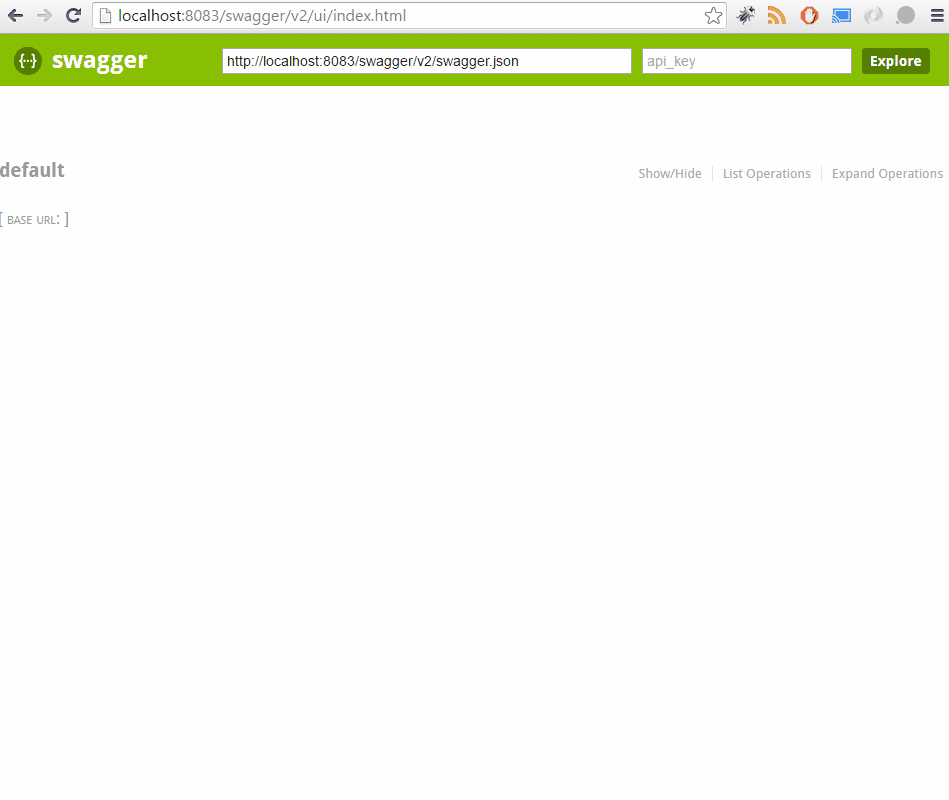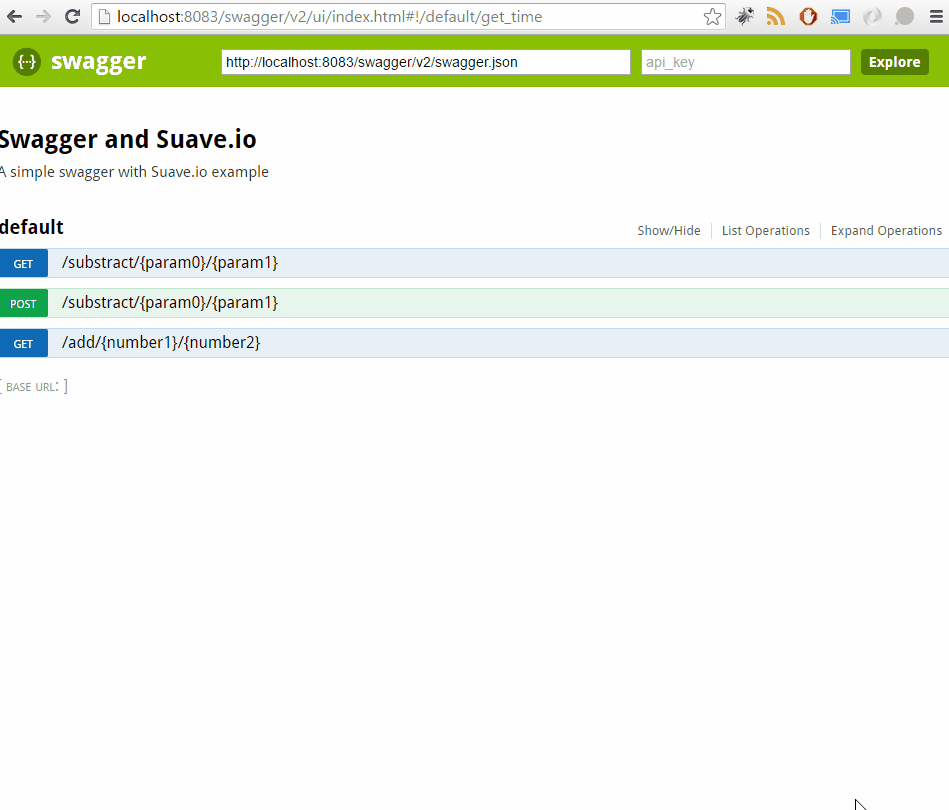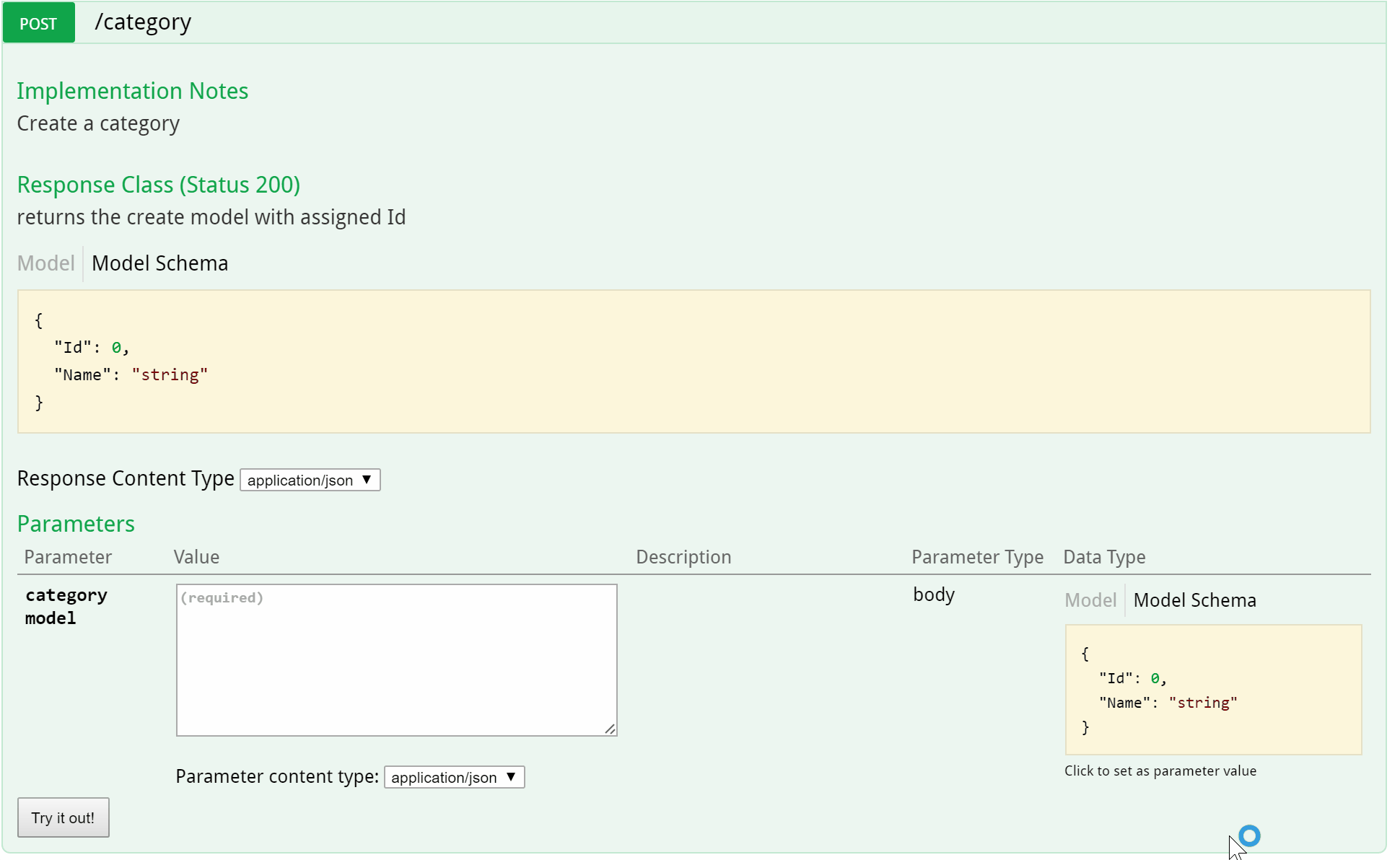Scenario 1
We want to create an API returning current time.
Simple solution
1: 2: 3: 4: 5: 6: 7: 8: 9: 10: 11: 12: 13: 14: 15: 16: 17: |
|
Go to http://localhost:8083/time1
Documented solution
1: 2: 3: 4: 5: 6: 7: 8: 9: 10: 11: 12: 13: 14: 15: 16: 17: 18: 19: 20: 21: 22: 23: 24: 25: 26: |
|
Go to http://localhost:8083/swagger/v2/ui/index.html

Scenario 2
Creating a service returning calculation results
1: 2: 3: 4: 5: 6: 7: 8: 9: 10: 11: 12: 13: 14: 15: 16: 17: 18: 19: 20: |
|
- urlFormat will extract parameters from the PrintfFormat, documente them and build the Suave's native "pathScan"
- we can use directly a pathScan and manually document the pathScan route.

Scenario 3
Returning models
1: 2: 3: 4: 5: 6: 7: 8: |
|
REST functions simulating a database access:
1: 2: 3: 4: 5: 6: 7: 8: 9: 10: 11: 12: 13: 14: 15: |
|
API:
1: 2: 3: 4: 5: 6: 7: 8: 9: 10: 11: 12: 13: 14: 15: 16: 17: 18: 19: 20: 21: 22: 23: 24: 25: 26: 27: 28: 29: 30: 31: 32: 33: |
|

namespace System
namespace Suave
module Operators
from Suave
from Suave
module Filters
from Suave
from Suave
module Writers
from Suave
from Suave
module Successful
from Suave
from Suave
val now1 : x:HttpContext -> Async<HttpContext option>
Full name: Tutorial.now1
Full name: Tutorial.now1
Multiple items
module WebPart
from Suave
--------------------
type WebPart = WebPart<HttpContext>
Full name: Suave.Http.WebPart
--------------------
type WebPart<'a> = 'a -> Async<'a option>
Full name: Suave.WebPart.WebPart<_>
module WebPart
from Suave
--------------------
type WebPart = WebPart<HttpContext>
Full name: Suave.Http.WebPart
--------------------
type WebPart<'a> = 'a -> Async<'a option>
Full name: Suave.WebPart.WebPart<_>
val x : HttpContext
Multiple items
module HttpContext
from Suave.Http
--------------------
type HttpContext =
{request: HttpRequest;
runtime: HttpRuntime;
connection: Connection;
userState: Map<string,obj>;
response: HttpResult;}
member clientIp : trustProxy:bool -> sources:string list -> IPAddress
member clientPort : trustProxy:bool -> sources:string list -> Port
member clientProto : trustProxy:bool -> sources:string list -> string
member clientIpTrustProxy : IPAddress
member clientPortTrustProxy : Port
member clientProtoTrustProxy : string
member isLocal : bool
static member clientIp_ : Property<HttpContext,IPAddress>
static member clientPort_ : Property<HttpContext,Port>
static member clientProto_ : Property<HttpContext,string>
static member connection_ : Property<HttpContext,Connection>
static member isLocal_ : Property<HttpContext,bool>
static member request_ : Property<HttpContext,HttpRequest>
static member response_ : Property<HttpContext,HttpResult>
static member runtime_ : Property<HttpContext,HttpRuntime>
static member userState_ : Property<HttpContext,Map<string,obj>>
Full name: Suave.Http.HttpContext
module HttpContext
from Suave.Http
--------------------
type HttpContext =
{request: HttpRequest;
runtime: HttpRuntime;
connection: Connection;
userState: Map<string,obj>;
response: HttpResult;}
member clientIp : trustProxy:bool -> sources:string list -> IPAddress
member clientPort : trustProxy:bool -> sources:string list -> Port
member clientProto : trustProxy:bool -> sources:string list -> string
member clientIpTrustProxy : IPAddress
member clientPortTrustProxy : Port
member clientProtoTrustProxy : string
member isLocal : bool
static member clientIp_ : Property<HttpContext,IPAddress>
static member clientPort_ : Property<HttpContext,Port>
static member clientProto_ : Property<HttpContext,string>
static member connection_ : Property<HttpContext,Connection>
static member isLocal_ : Property<HttpContext,bool>
static member request_ : Property<HttpContext,HttpRequest>
static member response_ : Property<HttpContext,HttpResult>
static member runtime_ : Property<HttpContext,HttpRuntime>
static member userState_ : Property<HttpContext,Map<string,obj>>
Full name: Suave.Http.HttpContext
val async : AsyncBuilder
Full name: Microsoft.FSharp.Core.ExtraTopLevelOperators.async
Full name: Microsoft.FSharp.Core.ExtraTopLevelOperators.async
val OK : body:string -> WebPart
Full name: Suave.Successful.OK
Full name: Suave.Successful.OK
Multiple items
type DateTime =
struct
new : ticks:int64 -> DateTime + 10 overloads
member Add : value:TimeSpan -> DateTime
member AddDays : value:float -> DateTime
member AddHours : value:float -> DateTime
member AddMilliseconds : value:float -> DateTime
member AddMinutes : value:float -> DateTime
member AddMonths : months:int -> DateTime
member AddSeconds : value:float -> DateTime
member AddTicks : value:int64 -> DateTime
member AddYears : value:int -> DateTime
...
end
Full name: System.DateTime
--------------------
DateTime()
(+0 other overloads)
DateTime(ticks: int64) : unit
(+0 other overloads)
DateTime(ticks: int64, kind: DateTimeKind) : unit
(+0 other overloads)
DateTime(year: int, month: int, day: int) : unit
(+0 other overloads)
DateTime(year: int, month: int, day: int, calendar: Globalization.Calendar) : unit
(+0 other overloads)
DateTime(year: int, month: int, day: int, hour: int, minute: int, second: int) : unit
(+0 other overloads)
DateTime(year: int, month: int, day: int, hour: int, minute: int, second: int, kind: DateTimeKind) : unit
(+0 other overloads)
DateTime(year: int, month: int, day: int, hour: int, minute: int, second: int, calendar: Globalization.Calendar) : unit
(+0 other overloads)
DateTime(year: int, month: int, day: int, hour: int, minute: int, second: int, millisecond: int) : unit
(+0 other overloads)
DateTime(year: int, month: int, day: int, hour: int, minute: int, second: int, millisecond: int, kind: DateTimeKind) : unit
(+0 other overloads)
type DateTime =
struct
new : ticks:int64 -> DateTime + 10 overloads
member Add : value:TimeSpan -> DateTime
member AddDays : value:float -> DateTime
member AddHours : value:float -> DateTime
member AddMilliseconds : value:float -> DateTime
member AddMinutes : value:float -> DateTime
member AddMonths : months:int -> DateTime
member AddSeconds : value:float -> DateTime
member AddTicks : value:int64 -> DateTime
member AddYears : value:int -> DateTime
...
end
Full name: System.DateTime
--------------------
DateTime()
(+0 other overloads)
DateTime(ticks: int64) : unit
(+0 other overloads)
DateTime(ticks: int64, kind: DateTimeKind) : unit
(+0 other overloads)
DateTime(year: int, month: int, day: int) : unit
(+0 other overloads)
DateTime(year: int, month: int, day: int, calendar: Globalization.Calendar) : unit
(+0 other overloads)
DateTime(year: int, month: int, day: int, hour: int, minute: int, second: int) : unit
(+0 other overloads)
DateTime(year: int, month: int, day: int, hour: int, minute: int, second: int, kind: DateTimeKind) : unit
(+0 other overloads)
DateTime(year: int, month: int, day: int, hour: int, minute: int, second: int, calendar: Globalization.Calendar) : unit
(+0 other overloads)
DateTime(year: int, month: int, day: int, hour: int, minute: int, second: int, millisecond: int) : unit
(+0 other overloads)
DateTime(year: int, month: int, day: int, hour: int, minute: int, second: int, millisecond: int, kind: DateTimeKind) : unit
(+0 other overloads)
property DateTime.Now: DateTime
DateTime.ToString() : string
DateTime.ToString(provider: IFormatProvider) : string
DateTime.ToString(format: string) : string
DateTime.ToString(format: string, provider: IFormatProvider) : string
DateTime.ToString(provider: IFormatProvider) : string
DateTime.ToString(format: string) : string
DateTime.ToString(format: string, provider: IFormatProvider) : string
Multiple items
type EntryPointAttribute =
inherit Attribute
new : unit -> EntryPointAttribute
Full name: Microsoft.FSharp.Core.EntryPointAttribute
--------------------
new : unit -> EntryPointAttribute
type EntryPointAttribute =
inherit Attribute
new : unit -> EntryPointAttribute
Full name: Microsoft.FSharp.Core.EntryPointAttribute
--------------------
new : unit -> EntryPointAttribute
val main : argv:string [] -> int
Full name: Tutorial.main
Full name: Tutorial.main
val argv : string []
val time1 : (HttpContext -> Async<HttpContext option>)
val GET : WebPart
Full name: Suave.Filters.GET
Full name: Suave.Filters.GET
val path : pathAfterDomain:string -> WebPart
Full name: Suave.Filters.path
Full name: Suave.Filters.path
val startWebServer : config:SuaveConfig -> webpart:WebPart -> unit
Full name: Suave.Web.startWebServer
Full name: Suave.Web.startWebServer
val defaultConfig : SuaveConfig
Full name: Suave.Web.defaultConfig
Full name: Suave.Web.defaultConfig
namespace Suave.Swagger
module Rest
from Suave.Swagger
from Suave.Swagger
module FunnyDsl
from Suave.Swagger
from Suave.Swagger
Multiple items
module Swagger
from Suave.Swagger
--------------------
namespace Suave.Swagger
module Swagger
from Suave.Swagger
--------------------
namespace Suave.Swagger
val a : int
val b : int

